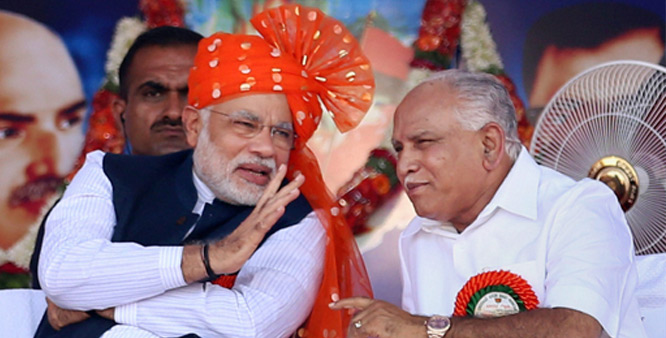The Congress has stumbled in the race for the Karnataka assembly elections with the JD(S) announcing that it won’t be entering into an alliance with the Congress, meaning that the Congress is left to fend for itself in the face of massive anti incumbency. The BJP, however, seems to have hit the right chord. It has announced in its election manifesto for the Karnataka elections that it will usher in a historic reform by freeing Hindu temples from government control and interference.
The BJP manifesto released by former Chief Minister BS Yeddyurappa has promised to ensure that there will be no government interference in temple administration and maintenance. It has also promised that the government will apply temple revenue only for religious affairs. It has been undertaken that the revenue will be used for expenditure on temples and related religious institutions. To that end, a 500 crore “Devalaya Punnaruthana Fund” is proposed to be set up, with funds of Rs. 500 crore for restoration and renovation of temples and mathas. Another much awaited reform promised in the manifesto is ensuring that all bodies administering Hindu religious institutions will consist solely of members belonging to the Hindu community.
The issue of arbitrary state control over Hindu temples is a burning issue in the state of Karnataka. There has been a strong demand among Hindus in Karnataka to rid the temples across the state from government interference. The Siddaramaiah government had irked the Hindus in the state when it came in public domain that it was considering inclusion of mutts and temples controlled under the purview of the Hindu Religious Institutions and Charitable Endowments Act. The Hindus across the state are visibly upset over this issue especially when the Congress government had in the past made several unsuccessful attempts to bring Hindu temples within government purview.
However, the issue is not limited to the electoral equations for the upcoming elections. The issue of state discrimination with regard to Hindu temples has been a long standing issue. Article 26 of the Constitution empowers every religious denomination to manage their religious affairs including the liberty to establish and maintain religious institutions. However, in the case of Hindus this power has either been diluted or taken over by the state governments through the Hindu Religious and Charitable Endowment Acts. Therefore, the Hindus have been incapacitated to administer their own religious institutions and the pseudo-secular governments have systematically conspired to take over financial management of Hindu temples and mathas. In fact, the pseudo secular motive of taking over only Hindu religious institutions was voiced by Jawaharlal Nehru himself who, in 1951, expressed the desire of leaving no private Hindu temple in India.
The question that arises here is why only the Hindus are seen as incapable of managing their temples and religious institutions while others are given full autonomy to manage their institutions. The government does not interfere with the finances of Christian or Muslim institutions, then who gives it the right to appropriate the revenues received by Hindu temples? It is outrageous that revenue proceeds for Hindu temples have been reportedly applied to mosques, churches, Muslim and Christian educational institutions, madrasas and Haj subsidies. For a state that claims to be secular it does not make sense to systematically plunder the finances of a particular religion and apply them elsewhere.
The supporters of this sinister conspiracy have time and again conveniently cited Article 30 of the Constitution of India that permits minorities to establish and administer educational institutions of their choice. But these self-acclaimed intellectuals fail to answer how the state can stifle the right to manage religious affairs which extends to the Hindu community as much as it does to any other religious denomination.
The BJP has, however, finally taken the first step in dismantling the system nurtured by successive anti-Hindu governments which had diluted the fundamental right of Hindus to manage their religious affairs. Nothing less than the parity of Hindu temples with Muslim mosques or Christian churches is acceptable. Either the state should give up on all controls exercised over Hindu temples, or the Muslim/ Christian religious institutions should be subjected to similar restraints. For decades, Hindus have been made to feel like aliens and second class citizens, even as the state took over some of their basic collective rights. It is quite common that a religious denomination manages its religious affairs on its own without any unwarranted government interference. The state has no business in diluting this right and that too only of a particular community. It seems that the BJP is finally going to usher in this landmark reform whereby the state will no longer try to hijack management of Hindi temples and mathas. The BJP will not only make a considerable impact on the Karnataka elections with this move but also correct a decades-old wrong committed against Hindus.

























